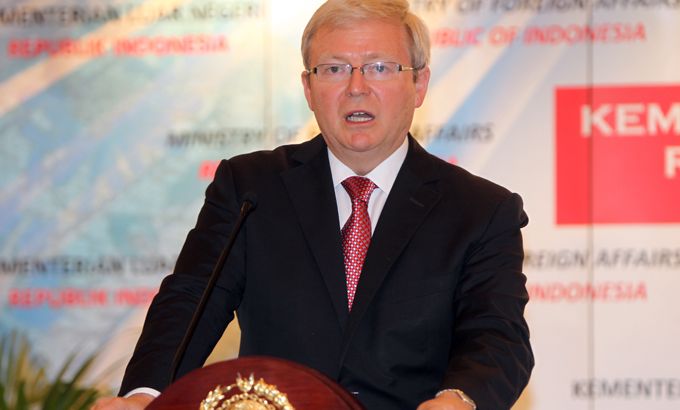Profile: Kevin Rudd
Former prime minister has gone through a rollercoaster rise and fall from the Labor party’s graces.

Australia’s only prime minister to be toppled, and to then avenge his rival in a counter-coup, is loved and loathed for his leadership style.
Kevin Rudd was the darling of Australian politics for years, before his party turned against him in 2010. The energetic Queenslander inherited a demoralised Australian Labor Party split by bitter factional divisions when he became its leader in December 2006. Rudd was swept to power the following year, when he was dubbed “Kevin 07” because he galvanised younger voters via social media. He now has almost 1.4 million Twitter followers.
The fluent Mandarin speaker promised closer engagement with Asia and wowed voters with a landmark apology to indigenous Australians for their treatment, which he delivered as prime minister in 2008. He unravelled the harsh immigration policies of John Howard, his predecessor, and kept Australia recession-free throughout the global financial crisis, a feat few other affluent economies managed to achieve.
But in June 2010, Rudd stepped down from office to avoid a humiliating party vote, after his popularity had fallen in opinion polls.
He was despised by some in his party and in public service, who nicknamed him “Kevin 24/7”, referring to his tireless work ethic. Canberra insiders complained Rudd expected the same from them.
Rudd’s downfall paved the way for his deputy Julia Gillard to become the country’s first female leader. Gillard appointed Rudd as foreign minister after she became prime minister following the 2010 federal election, returning him to prominence.
During this time, leaked US embassy cables published by WikiLeaks referred to Rudd as an impulsive “control freak” who had presided over foreign policy blunders.
Born in the tiny town of Nambour in southeastern Queensland in 1957, Rudd endured a tough childhood. For a time when he was 11-years-old, he slept in a car after his family was evicted from their farm, following his father’s death in a car crash. Rudd said that experience shaped the views on social justice that led him to run for federal parliament, to which he was first elected in 1998.
Rudd’s downfall
Rudd has three children and his wife, Therese Rein, is a self-made millionaire businesswoman, a fact that plays well with female voters.
The start of Rudd’s downfall can be traced back to his failed attempt to pass emissions trading laws. His public dust-up with the powerful mining industry over plans to introduce a 40 percent “super-profits tax” ultimately led to his initial political demise, amid plummeting poll ratings.
Rudd also faced criticism over a steady flow of boats carrying asylum seekers approaching Australian shores, and for failing to achieve better ties with China, despite the two countries’ booming resources trade.
His government’s $58bn stimulus package was credited with maintaining Australia’s growth during the global economic crisis and spurring a strong recovery.
However, senior ministers called Rudd “dysfunctional” during his unsuccesful leadership challenge in 2012 and said they could never work with him again. One Labor politician told a television programme Rudd was a “psychopath with a giant ego”. A video was leaked of Rudd losing his temper in an expletive-laden rant, but many Australians praised him for being a “normal bloke” who swore just like them.
In June 2013, the 55-year-old challenged Gillard again amid dire poll ratings, and succeeded in toppling his rival.
Since becoming prime minister for a second time, Rudd’s controversial policy of detaining asylum-seekers who had attempted to reach Australia by boat in offshore processing centres has been criticised by the UN, but it briefly lifted Labor’s popularity in opinion polls.
Facing sinking poll ratings during the 2013 election campaign, the tenacious Labor leader described himself as the “comeback kid”.
He was unable, however, to defeat Tony Abbott’s right-wing Liberal party, and after Labor slumped to a landslide defeat, Rudd stood down as party leader – less than three months after retaking the mantle from Gillard.